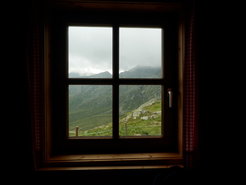The (Im)possibility of Ethnographic Research during Corona
In early March, life as we knew it underwent a dramatic change for many Europeans, and with it our understanding of ourselves and our world. As we watched the alarming scenes in the media of hopelessly overwhelmed hospitals in northern Italy, desperate appeals for help from medical workers, and convoys of vehicles transporting the dead, we collectively were forced to recognize that we were in the middle of a pandemic. The mysterious new coronavirus and the lockdown of society that it brought with it was no longer – as in the preceding months – merely something happening far away in China. For many, the circulating images from Italy solidified the awareness that COVID-19 was already among us and that it represented a more substantial danger than a passing outbreak of the flu. And with this recognition, things started happening at an unprecedented speed. In rapid succession, public life and economic activities were brought to a standstill, borders were closed, and freedom of movement was reduced to a minimum. Suddenly many things that people had until a few days ago considered a fundamental part of life as a citizen in a liberal democracy could no longer be taken for granted. Even the most ordinary forms of daily mobility – working at one’s job, commuting via public transportation, going shopping, visiting friends and family – were suddenly laden with complex bureaucratic and moral constraints.

The Disappearance of Everyday Life
For anthropologists, too, the COVID-19 pandemic brings with it immense challenges for our work and research. To be sure, articles for academic journals or book projects can be written from the refuge of home office and meetings or seminars can, for the time being, be conducted via online platforms. But the heart of our research, the activity from which all of our findings are derived – namely the observation and analysis of the everyday sociocultural world – is not possible without direct contact with the people living these lives. In public discussions of the effects of the crisis, the closure of scientific laboratories is frequently mentioned. Without access to machines, specialized equipment, and material, many experiments cannot be carried out and consequently, it is feared, we will be deprived of important scientific innovations that are delayed or cancelled as a result of the pandemic. There is far less discussion of how the corona restrictions affect research in the social sciences. But social science is also based on empirical research, and many researchers are confronted with much the same difficulties as their colleagues in the natural sciences. And this includes anthropologists. The “laboratory” that social anthropologists use is not located within the walls of their research institute, but in society itself, and their “experiments” are the social processes that take place there. Thus, when we pull the plug on social life, anthropologists are deprived of the source from which they produce knowledge.

Empty Streets, Closed Doors
Over the past months my research group has had the painful experience of attempting to carry out ethnographic research under the current conditions. It has proved virtually impossible. We are studying the meaning of belonging, tradition, and alienation in a rapidly changing world with a focus is on communities in the German-speaking Alpine region and the role of history in creating feelings of belonging or alienation. The political backlash against inclusive ideals that has been spreading in many societies in recent years shows that the relevance of the questions my research group addresses is not limited to the small villages where our research takes place; rather, they are of great socio-political importance for the world as a whole. But just as we were getting ready to leave for our field sites in Austria, Germany, and Italy, COVID-19 threw a wrench in the works.
Ethical Responsibility during the Crisis
The official order to reduce social contact to a minimum made it impossible to build relationships with the local people – an activity that forms the backbone of ethnographic research. When public spaces for people to meet and mingle are empty, when the conversations of the regulars at the village tavern have gone silent and people seek out the safety of their own four walls, anthropological research also has to be put in hibernation. In addition to the practical difficulties that forced us to delay our field research indefinitely, this decision was also guided by important ethical considerations. As researchers we have a responsibility to carefully consider the consequences of all our actions and avoid causing harm to the people who will serve as partners in our research. Because anthropologists constantly circulate among their contacts, moving between various households, social groups, and people, engaging in such activities during an acute outbreak of a pandemic means to risk contributing to the further spread of the virus. This risk is a reminder of how essential it is to follow the ethical precepts of our discipline and give them precedence over our research interests.
Reinventing Anthropological Research
The enormous impact of the coronavirus outbreak on our discipline can be seen in the innumerable blog posts, articles in journals, and online workshops that have appeared over the last several months and are all concerned with finding answers to the same urgent questions: How do we cope with this unheard of situation? How do we make sure that this crisis does not force the next generation of researchers – the doctoral students who have had to interrupt their field research or were prevented from beginning it – to cease activities altogether or hinder them from properly learning the tools of our trade? And how can we study the pandemic and the radical effects it has had on the everyday lives of people around the world when we can’t be there and talk to them in person? We did what people have ever done during crises: we improvised. Since in many places social life has been relocated to the virtual space of the internet, many anthropologists have followed suite, adapting their methods to online research. For my group, too, online tools and social media platforms offered a way to stay in contact with our research sites and the people who live there when we could not be present ourselves. But we also discovered that online ethnography cannot, over the long term, substitute for field research on site. Online observation can only provide insight into the very specific spaces of the online world, where other rules apply than in the realm of offline social interactions. Online research must depend heavily on narratives, but one of the strengths of ethnographic research is the way that it sees more than just the information that people give us in interviews. Only long-term immersion in the realities of a place enables us to observe phenomena in their full complexity and notice and analyse the inexplicit, unwritten rules that govern the social world.
Understanding the Pandemic and Its Implications
While the public discourse over the past months has quite understandably focused heavily on the expertise of virologists, epidemiologists, and medical professionals, there is an increasing awareness that many fundamental questions and challenges posed by the coronavirus cannot be solved by relying only on mathematical models and quantitative predictions. This is especially evident in the growing mistrust directed towards political decision-makers, the dissatisfaction with the media and its reporting, and the (dare one say) viral spread of conspiracy theories. Through its ability to distil knowledge from people’s lived experiences, social anthropology can play an important role in understanding the socio-political upheaval created by the coronavirus. This also applies to my research group. Questions of belonging and alienation have become even more important in the wake of the societal transformations set in motion by the pandemic. The gradual return in many parts of Europe to something approximating normality gives us hope that we will soon be able to resume the study of these phenomena in the villages in Bavaria, Carinthia, and South Tyrol that we had to abandon so precipitously in March. Yet as long as the pandemic continues to run its course and no vaccine against COVID-19 is available, any return to field research will take place in greatly modified form, with many limitations and all necessary precautions to prevent the spread of the virus.

